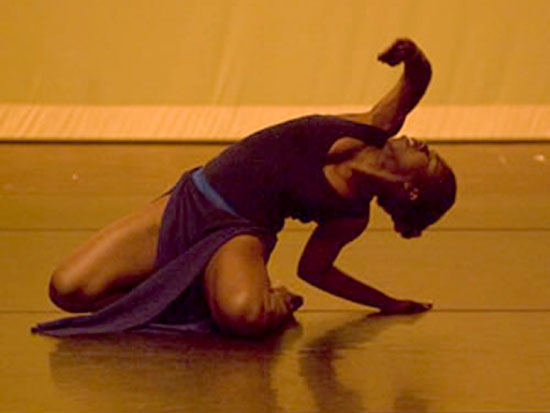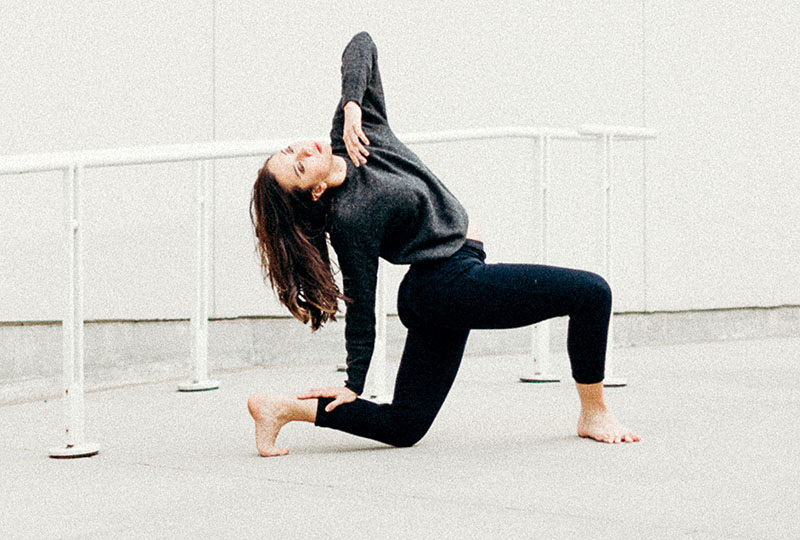Acknowledging the Impact
An Interview with Crystal Faison-Mitchell and Jacquelyn Pritz at DanceATL
BY EMMALY WIEDERHOLT
Jacquelyn Pritz is the operations manager and Crystal Faison-Mitchell is on the board of directors at DanceATL, a dance service organization that provides resources, promotion, and collaborative opportunities for the dance community in metro Atlanta and surrounding areas. Here, they share how DanceATL has created points of connection for their dance community, how DanceATL is rolling out a new membership structure, and how technology has been a source of access but not necessarily of equity.
This interview is part of a series looking at how dance organizations have responded to the tumultuous events of 2020.
 Crystal Faison-Mitchell
Crystal Faison-Mitchell
~~
What was DanceATL’s initial response to the pandemic back in March and April?
Jacquelyn: As soon as things started to get serious, we immediately created a COVID-19 resource page on our website that was continuously updated throughout the summer. We had some programming planned for March that was put on pause indefinitely. Meetings with our volunteers immediately went digital. We were trying to keep up with all the performances and events that were either going virtual, cancelled, or postponed. We just tried to keep everyone up to date.
Crystal: We also offered two listening sessions to connect with people in the dance community just to give them a moment to express themselves and how the pandemic was impacting them as artists and dancers. At that point, all the technical aspects of the Economic Injury Disaster Loans and Payroll Protection Program were still new. People did not know if their studios or jobs were going away. We just wanted to listen to them about those fears, and also check in about the sense of isolation people started to feel very quickly by April and May. That was a reflective way people could be in community and talk to one another about the things they were going through.
How did DanceATL shift (or did it shift) in response to the George Floyd protests this past summer?
Jacquelyn: We immediately created a solidarity statement that was written collaboratively between me, all our board of directors, and our volunteers. DanceATL’s publication, which is called Promenade and is a digital newsletter where we interview artists in the community, was planned on being released that Monday, but we decided to postpone that and instead focus on what was happening. We later updated the statement on our website with resources.
Crystal: Those resources still live on DanceATL’s website. Each board meeting and each time we get together as a community, we take a moment at the top of our meetings to bring back into our awareness the commitment we made in our solidarity statement. We don’t want it to be just words; we want it to be a living statement. As a service organization, we’ve made a commitment to build bridges within the dance community and to be a resource for dancers who are from marginalized populations. There’s a lot of work to be done. Obviously, we are not perfect. We have to keep digging and reaching out to all populations and especially to those who are Black, Indigenous, and people of color. We are committed to continuously reminding ourselves of the work that needs to be done.
What are some ways DanceATL is currently responding to the needs of the dance community?
Jacquelyn: DanceATL is currently gearing up to release a membership structure. Up to this point, everything has been free offerings in terms of our services and programming.
DanceATL recently hosted a stage management Tech Talk. Our Tech Talks are kind of like TED Talks, except they are about production and how it relates to dance. Pre-COVID, these were in-person, and this recent one was on Zoom.
We also created an artist matchmaking program called A.M. Collaborative. A lot of people were feeling uninspired to make new work or perhaps moved to Atlanta during the pandemic. For those looking to connect, artists signed up, we learned about their interests, whether they were looking for a collaborative partner or just someone to be accountable to, and then matched 24 artists together. We all meet once a month on Zoom. That started in October and will continue until February.
Crystal: One of the interesting things about A.M. Collaborative is it’s interdisciplinary; its intent is to bring together a dancer with a visual artist, or a writer with a dancer. We are continuously seeking to add artists outside of dance to make fun collaborations.
My most favorite aspect of our work thus far is our database of resources that links dancemakers to the resources they need, whether that’s other dancers, space, technical knowledge, etc. This ties into our upcoming membership structure. It builds on us being a hub that lets people know what’s going on, where they can rent space, where they can audition, and where they can take class. We can become a one stop shop so dancers aren’t searching all over the place and can find meaningful ways to make work and practice.
As DanceATL kicks off its membership structure in January 2021, we are hoping to keep it financially accessible. Because of the pandemic, membership dues will start as ‘pay-what-you-can’ with a recommended donation of at least $25. Originally, we wanted to have separate membership tiers for organizations versus individual artists, but now is not the time. We want for it be possible for dancers to sponsor other dancers as well.
Looking toward the future, how far out does DanceATL feel able to plan? And are events all virtual, or have any in-person events been planned?
Jacquelyn: In terms of the big picture, we go year by year. This has been a big year for us, especially with the membership structure. We’re a newer organization; we’ve only been incorporated since May 2019. Everything right now is continuing to be virtual. That’s not to say things won’t change, but we’re just trying to monitor everything and keep our community safe.
Crystal: We’re dealing with a community of people whose bodies are their ways of making a living. To keep dancers safe, DanceATL is going to remain virtual. We’re also discussing having more listening sessions. We’re no longer sheltering in place in Georgia, and since a lot of us are employed by small businesses, it’s time to converse about how dancers are feeling while dancing and teaching in the middle of a pandemic. It can be both hard on the body and anxiety provoking.
On the other hand, people are getting Zoomed out. There’s a lot of information coming at people. We are in a unique space to sort through that for people and make it palatable. We recently brought on a marketing coordinator who works under the direction of Jacque to help lay out initiatives and market our programs for the purpose of our audience being able to easily digest information about upcoming workshops, auditions, and events. We have consistently released a top-of-the-week blast that includes all the dance classes and offerings that week, and then one for the weekend. It helps people stay organized. There has been more engagement, but it’s scattered because there are so many offerings. We’re happy to be a hub where people can find what’s going on.
How do you think 2020 is going to impact DanceATL in the long term?
Crystal: DanceATL originally started in the early 2010s, still with the goal of bridging gaps within the Atlanta dance community and encouraging local dancers to support each other’s work around the city. 2020 has re-sharpened our focus to those original goals and made us keenly aware of the type of programming we need. We know that we need to continue to build bridges. We know that dancers of color and particularly Black dancers are hurting. We’re going to continue to hold those types of conversations. Those conversations, along with the financial impact of the pandemic, will shape how we move forward.
Our programming comes from the people. We have a program called Quarterly Flock that started over Zoom this year which brings together all our volunteers, staff, and board of directors. We ask about long-term and immediate goals and what is needed. We don’t guess what the community needs; they tell us directly. Jacque has a close relationship with DanceATL’s committees and volunteers. We will remain responsive as much as possible when it comes to programming.
DanceATL doesn’t have any top-down structure. It’s very flat. Flocking is ironically the method by which DanceATL re-vamped its meetings in 2018. There were monthly meetings on Sunday afternoons, and at times, up to 30 dance artists would gather and write their personal priorities on post-it notes with the purpose of finding likenesses. These groupings were the foundation for the current-day committees. We’d see groups of people talking about dance writing, or resources, or classes. So as much as possible, I think that Jacque tries to remain within the flocking structure, as it has been successful in creating a sense of community.
Jacquelyn: At our first Quarterly Flock on Zoom, everyone was nervous about presenting what each committee was doing since it had been a while since the entire group had met like in the beginning. Toward the end, one of the board members played some music and we had a little dance party. Immediately, everyone felt more connected with one another and it was less of a meeting and more of a time to come together. Now we include that time at all our Quarterly Flocks.
How do you think 2020 is going to impact the dance field in the long term?
Jacquelyn: For me, it’s even more about accessibility. There are a lot more livestream happenings and use of the digital landscape. The question is: How do we use technology so it works for everyone? For our Instagram stories, we’re adding closed captioning. With Promenade on our website, we include visual descriptions for all the images. Douglas Scott, one of our board members and the artistic/executive director and founder of Full Radius Dance, taught me some Zoom etiquette such as introducing myself every time I speak. It makes offerings more accessible and broadens our audience.
Crystal: And we can also highlight Atlanta-based artists to folks outside the state of Georgia.
As dance schools transitioned to virtual classes, some teaching artists struggled to adapt. What if their laptop was broken, or their phone was out of storage, or their internet was not fast enough to support Zoom? It took time for these artists to adjust, and we have some folks who are just coming online 10 months later. So, for me, this year has also highlighted the inequality and inequity with regards to dancers often not having access to the resources required to be responsive in the face of crisis, and I’m hoping that DanceATL can be a source of information.
Any other thoughts?
Jacquelyn: I want to acknowledge the financial impact 2020 has had on the dance field. A lot of gigs were lost and studios folded. And as we transition to the digital landscape, a lot of people have been generously offering free performances and classes. But I’m hearing that many audience members or consumers have gotten into the habit of not paying for these offerings. As we one day approach a post-COVID-19 era, I hope the dance world emerges fiscally healthy and even more community-oriented, and that DanceATL can contribute to that.

Jacque Pritz, Photo by Lizzie Baker
~~
To learn more, visit danceatl.org.

One Response to “Acknowledging the Impact”
Thank you for sharing your insights and solutions for DanceAtl. The more we share and can encourage one another, the better we feel. And the better we feel, we ideally open doors to greater engagement in the dance arts. Viva la danse!
Comments are closed.